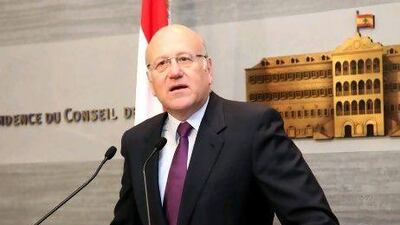While Beirut's shopping malls resound with the traditional refrains of Boney M and Wham, the airwaves are picking up the earnest tweets of the prime minister, Najib Mikati, (19,070 followers) and his predecessor Saad Hariri (56,909 followers). In a region on the brink, both clearly feel a more personal touch is what is needed, and I am reliably informed that neither employs a flunky to tweet for him.
Tomorrow's exclusives tonight:
Industry Insights e-newsletter Stay ahead of the pack and get the pick of the premium Business content straight to your inbox. Sign up
Mr Mikati told followers that, last Sunday, he and a "few ministers" toured the downtown retail district to "assess trade activity on-the-ground, especially during the festive season". In another tweet he pledged to visit other areas of the capital "to better understand the market [situation and] see how we can best boost commerce activity during festive season and beyond". It may have been a case of too little, too late. Much of Beirut's retail sector is already holding "seasonal discounts".
Not to be deterred, he also had a stab at coining a slogan, exhorting the Lebanese to "push and pull. Push the stability and the joie de vivre and pull more tourist [sic] to Lebanon", he tweeted.
"Stability" is clearly an elastic term in today's turbulent Middle East. Mr Mikati is the head of the government, but it, like the pushmi-pullyucreature in Dr Dolittle, has two heads: the official one, Mr Mikati's, and the unofficial one of Hizbollah's Hassan Nasrallah, who many see as really calling the shots in Lebanon.
But Mr Mikati is first and foremost a businessman, who in a different life built Investcom, a mobile telecommunications company with operations in West Africa, Sudan, Yemen and Afghanistan, which he sold to the MTN of South Africa in June 2006 for more than US$5 billion (Dh18.36bn). His personal fortune is estimated by Forbes to be more than $2bn.
No wonder, then, that he is trying to style himself as a would-be champion of business. Security concerns are out of his hands, so why not go out and try to make a difference among the Lebanese who are wondering if their economy will go to blazes next year? Barclays Capital might have recently predicted 3.8 per cent growth in GDP, but given the deteriorating security situation in South Lebanon and Syria, I find it amazing that anyone can see beyond next week.
Meanwhile, Mr Mikati's main Sunni rival, Mr Hariri, who was deposed in January, has been wielding his own BlackBerry. He too is a billionaire, who for security reasons has chosen to base himself in Saudi Arabia.
Back in January, Mr Hariri was confident there was not a credible Sunni in the land who would accept the prime minister's job after his dethroning. He forgot about Mr Mikati and his close relations with Syria's Assad family.
His posts-from-exile have sought to undermine Hizbollah and the Syrian regime. Last week's attack on a French UN peacekeeping convoy was, according to Mr Hariri, "another Syrian message". Still, it's not all doom and gloom; Mr Hariri has also promised his followers to bring the Canadian teen sensation Justin Bieber (15.3 million followers) to Beirut.
Among Mr Mikati's allies, Mr Nasrallah does not tweet, nor does his Christian partner, Michel Aoun of the Free Patriotic Movement (FPM). The Aounists nonetheless like to style themselves as the party that gets things done for the man in the street.
Gebran Bassil, the energy minister (1,032 followers), has proposed to drop value-added tax on fuel oil ahead of what is expected to be a cold winter. This is all very well, but the Lebanese would prefer solid policies rather than seasonal promotions.
Still everyone has to get his message across. Back on Twitter, Mr Mikati is still plugging away. "Political stability [and] security are key to attract more tourists/investments, increase consumer confidence [and] optimise purchasing power [and] commerce."
A cry for help perhaps?
(Michael Karam is a freelance writer and communication consultant based in Beirut)
twitter: Follow and share our breaking business news. Follow us

